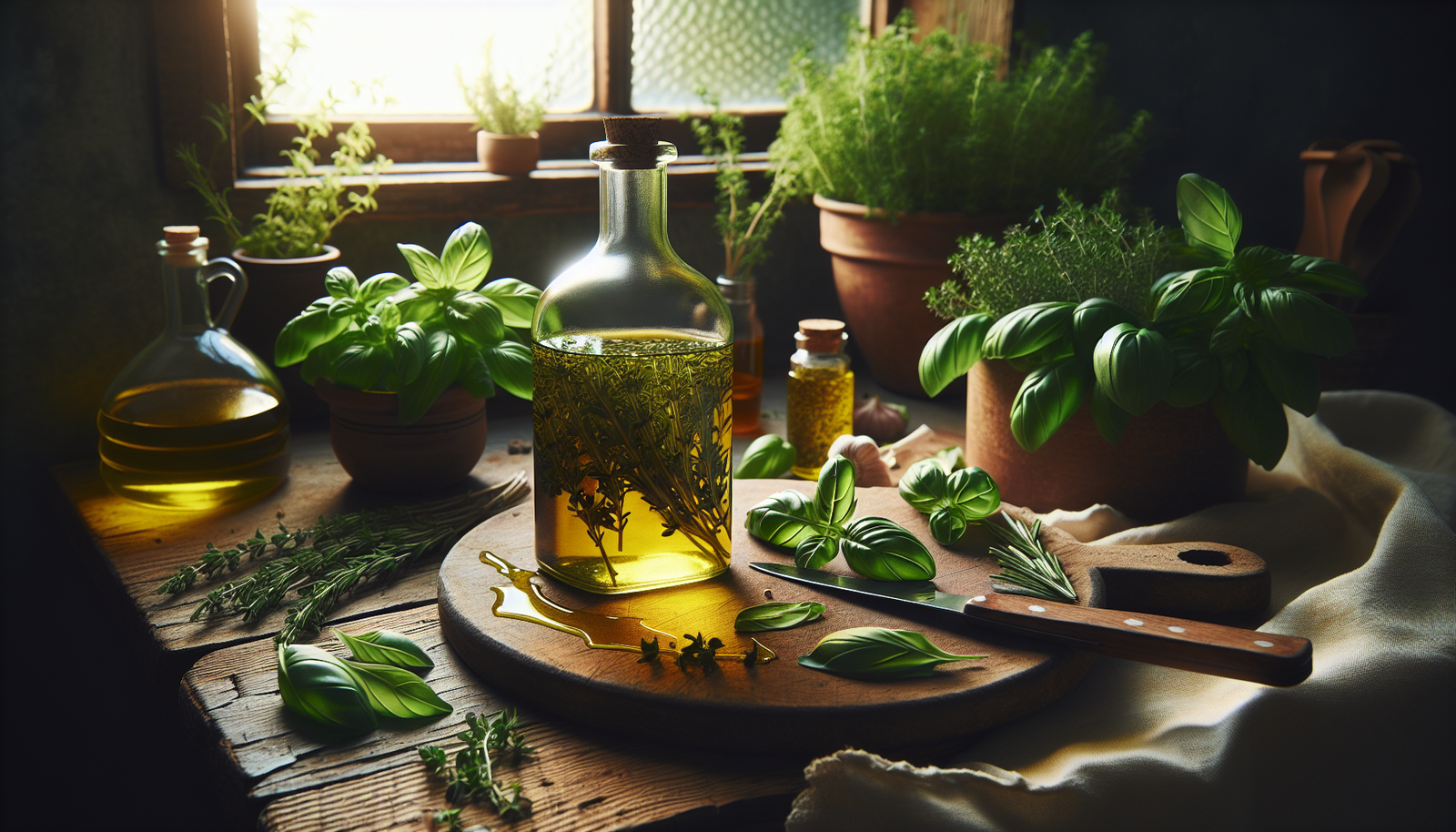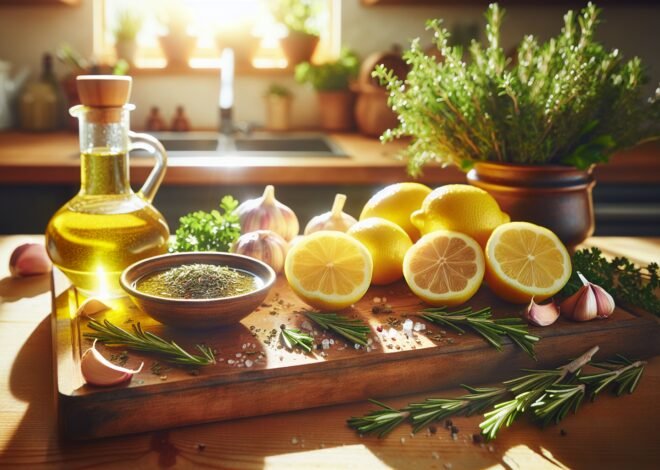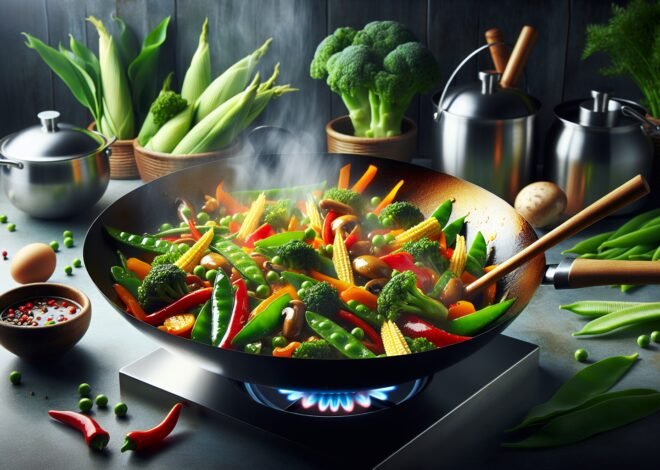
How to Make Fresh Herb-Infused Oils for Cooking and Drizzling
Make herb-infused oils to elevate your culinary creations with fresh, vibrant flavors. Not only do these oils add aromatic depth to dishes, but they also offer a touch of elegance, transforming ordinary meals into gourmet experiences. In this guide, you’ll discover simple methods for creating these culinary enhancers at home, using a variety of fresh herbs like rosemary, thyme, and basil. By incorporating these oils into your cooking repertoire, you’ll unlock a world of flavor possibilities. Explore step-by-step instructions, essential tips for selection, and preservation techniques to ensure your oils remain fresh and flavorful.
Why Make Fresh Herb-Infused Oils at Home
Creating herb-infused oils at home opens a world of flavors and health benefits. With just a little effort, you can transform ordinary oils into gourmet delights, enhancing your culinary creations. Let’s dive into why making these aromatic oils at home is so rewarding.
Benefits of Homemade Herb-Infused Oils
Homemade herb-infused oils offer numerous benefits. These oils provide a unique flavor profile that enhances dishes in ways commercial oils cannot. By using fresh ingredients, you ensure a depth of aroma and taste, making your meals memorable.
Personalizing your infusions allows you to experiment with combinations that suit your palate. Whether you prefer the robust flavor of rosemary or the subtle sweetness of basil, the possibilities are endless. These oils can elevate a simple salad or transform a roasted dish into a culinary masterpiece.
Moreover, homemade infusions are free from preservatives and artificial flavors, ensuring a healthier choice. You control the quality of ingredients, choosing organic or locally sourced herbs. This not only benefits your health but also supports sustainable practices.
Health Advantages of Using Herb-Infused Oils
Herb-infused oils are not just about taste—they offer significant health advantages. Many herbs contain beneficial compounds that, once infused, enrich the oil with nutrients. For instance, rosemary oil is known for its antioxidant properties, supporting overall health.
These oils can enhance your immune system, reduce inflammation, and improve digestion. Infusing oils with garlic, for example, adds allicin, known for its heart health benefits. Using these oils regularly can be an easy and delicious way to incorporate more nutrients into your diet.
Additionally, herb-infused oils can be used for topical applications, promoting skin health. Oils infused with lavender or chamomile can be soothing, providing relief from skin irritations or stress-related conditions. The versatility of these oils extends beyond the kitchen, offering holistic health benefits.
Cost-Effectiveness of DIY Herb-Infused Oils
Making herb-infused oils at home is cost-effective and budget-friendly. Store-bought gourmet oils can be pricey, but DIY versions allow you to enjoy similar quality at a fraction of the cost.
By purchasing herbs in bulk or growing them at home, you reduce expenses significantly. A small investment in quality base oils, such as olive or coconut oil, goes a long way when infused with your choice of herbs.
The process itself is simple and requires minimal equipment, making it accessible for anyone. With homemade oils, you’re investing in both flavor and health, all while saving money. This cost-effectiveness makes DIY herb-infused oils a smart choice for everyday cooking and wellness.
Tips for Selecting and Preparing Fresh Herbs
The key to exceptional herb-infused oils lies in selecting and preparing the right herbs. Quality matters, and knowing how to handle your herbs can make all the difference in the final product. Here are some tips to ensure your oils are infused with maximum flavor.
Best Herbs for Infusion Oils and Their Flavors
Certain herbs are particularly suited for oil infusion due to their robust flavors and aromatic properties. Here’s a list of some of the best options:
- Rosemary: Offers a piney, woodsy flavor, great for meats and roasted vegetables.
- Basil: Provides a sweet and peppery taste, perfect for Italian dishes and salads.
- Thyme: Adds an earthy, minty note, versatile for soups and stews.
- Lavender: Imparts a floral, slightly sweet flavor, ideal for desserts and dressings.
- Garlic: Known for its pungent, savory flavor, enhances sauces and marinades.
Experimenting with these herbs allows you to create unique blends. Mixing herbs, like combining basil with garlic or rosemary with thyme, can lead to exciting flavor profiles.
Cleaning and Drying Herbs for Infusion
Proper cleaning and drying of herbs are crucial steps in the infusion process. Start by rinsing herbs under cold water to remove dirt and debris. Gently pat them dry with a clean towel or use a salad spinner to remove excess water.
Drying is essential to prevent mold growth in your oils. You can air-dry herbs by hanging them upside down in a cool, dry place or use a dehydrator for faster results. Ensure they are thoroughly dried before infusing to maintain the oil’s quality.
How to Store Fresh Herbs Before Infusing
Storing fresh herbs correctly before infusion is important to keep them fresh and flavorful. Wrap them in a damp paper towel and place in a resealable bag in the refrigerator. This method helps maintain their moisture and extends their freshness for up to a week.
For longer storage, consider freezing herbs. Chop them and place in ice cube trays with a little water or oil, then freeze. These herb cubes are perfect for later use, maintaining their aroma and flavor during infusion.
Step-by-Step Guide to Making Herb-Infused Oils
Creating herb-infused oils at home is a straightforward process that can be tailored to your taste preferences. With the right tools and methods, you can produce aromatic oils that enhance your culinary experiences. Let’s explore the steps involved in making these delightful infusions.
Tools and Ingredients Needed for Infused Oils
To make herb-infused oils, you’ll need a few essential tools and ingredients:
- Fresh Herbs: Choose high-quality herbs, either homegrown or purchased.
- Base Oil: Select a neutral oil like olive, grapeseed, or sunflower oil.
- Glass Jars or Bottles: Use sterilized containers to store the infused oils.
- Strainer or Cheesecloth: For filtering out herbs after infusion.
- Funnel: Helps pour oils into jars without spilling.
Having these tools ready ensures a smooth infusion process, allowing you to focus on creating flavorful oils.
Methods of Infusing Oils: Cold vs. Heat
There are two primary methods for infusing oils: cold and heat infusion. Each has its own benefits and can be chosen based on your preference and time availability.
Cold Infusion: This method involves placing herbs in oil and allowing them to steep for several weeks. The slow process ensures a gentle extraction of flavors, preserving the delicate notes of the herbs.
Heat Infusion: Involves gently heating the oil and herbs together to speed up the infusion process. This method is quicker but requires careful monitoring to avoid overheating, which can damage the oil.
Both methods result in delicious infused oils, so choose based on the time you have and the flavor intensity desired.
Safe Storage and Shelf Life of Herb-Infused Oils
Proper storage of herb-infused oils is crucial for maintaining their freshness and flavor. Store oils in a cool, dark place, away from direct sunlight to prevent oxidation.
Use airtight glass bottles or jars to keep the oils protected from air exposure. This helps extend their shelf life, which typically ranges from a few weeks to several months, depending on the oil and method used.
Regularly check your oils for any signs of spoilage, such as off smells or cloudiness. Storing oils in the refrigerator can further prolong their shelf life, especially when infusing with fresh herbs, which may introduce moisture.
“`
This structured approach provides detailed guidance on creating herb-infused oils, from selection to storage, ensuring readers have the knowledge they need to successfully craft their own flavorful infusions at home.
Conclusion
Herb-infused oils are made by steeping fresh or dried herbs in a carrier oil to impart flavor and fragrance. Common carrier oils include olive oil, sunflower oil, and grape seed oil. The process requires heating the oil with herbs to release essential oils, then straining to remove plant material. Proper storage in a cool, dark place ensures longevity and prevents spoilage. Herb-infused oils are used for cooking, skincare, and aromatherapy.
FAQ
How do you make herb-infused oils at home safely?
To safely make herb-infused oils, start by selecting high-quality herbs and oils. Clean and dry the herbs thoroughly. Combine the herbs and oil in a sterilized jar, ensuring the herbs are fully submerged to prevent mold. Seal the jar tightly and store it in a cool, dark place.
What are the best herbs to use for making infused oils?
Great herbs for infused oils include rosemary, thyme, basil, and oregano. Lavender and mint also add distinctive flavors. Choose herbs that complement the intended use of the oil, whether for cooking or skincare.
How long should you let herbs infuse in oil for optimal flavor?
For the best flavor, infuse herbs in oil for 1 to 4 weeks. Shake the jar occasionally to help the flavors meld. The longer infusion time allows for a richer taste.
Can you use fresh herbs when making infused oils, or should they be dried?
Both fresh and dried herbs can be used for infused oils. Dried herbs are less likely to cause spoilage. If using fresh herbs, ensure they are completely dry to avoid introducing moisture that can lead to bacterial growth.
What type of oil is best for making herb-infused oils?
Olive oil is a popular choice due to its rich flavor and stability. Other options include sunflower, grapeseed, or avocado oil. Select a neutral-flavored oil if you prefer the herb’s flavor to stand out.
How should you store homemade herb-infused oils to ensure freshness?
Store homemade herb-infused oils in a cool, dark place in tightly sealed bottles. For extended freshness, refrigerate the oils. Use the oils within a few months to enjoy their full flavor and benefits.











